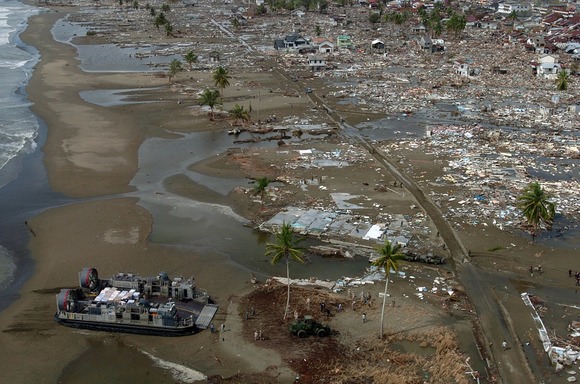
Earthquakes, landslides, heat waves, and droughts are some of the most likely natural disasters that can occur in the San Pedro California area. Learn more about these risks and how to prepare your home and family.
Earthquakes
Prone to serious earthquakes, it’s imperative that California residents be prepared by planning and practicing what you should do if the earth starts shaking.
Most deaths and injuries happen when building materials collapse or, more commonly, heavy objects fall on someone. Secure wall hangings, large furniture pieces, air conditioning units, and water heaters to the wall using straps.
Practice earthquake drills, evacuation routes, and communication plans with your family. Write down phone numbers and other essential information, place vital documents in a fire-proof safe, learn how to check utilities, and read about what you should do right after an earthquake.
Landslides
Landslides are very common in California. They can occur when there is a disturbance in the natural stability of a slope such as:
After an earthquake
After heavy rain or a prolonged drought
When wildfire or construction has destroyed vegetation
Where surface water is directed
Protect your home from a landslide by learning where previous landslides have occurred, contacting local authorities about emergency and evacuation plans and sharing those with your family, planting ground cover and building retaining walls, and educating yourself on the signs of an impending landslide.
Droughts
A drought is a period of abnormally dry weather that lasts long enough to cause crop damage and water supply shortages. During these times, follow official water restrictions. You should also follow voluntary conservation measures. A few of the things you can do are:
Never pour water down the drain when there is another use for it, such as watering plants.
Repair dripping faucets.
Replace your showerhead with an ultra low-flow design.
Patronize a commercial car wash that only uses recycled water and other businesses that support smart water usage.
Water your lawn and garden in several short sessions rather than one long one to boost moisture absorption.
Allow your grass to grow longer before mowing. Even better, replace it with drought-tolerant ground cover.
Install a water-saving pool filter and a cover to reduce water evaporation.
Support community projects that increase reclaimed wastewater usage.
Heat Waves
It may surprise you, but heat waves (an extended period of unusually high temperatures) are the number one cause of weather-related fatalities in the United States. Young children, adults over the age of 65, and pets are most likely to experience a heat-related illness such as heat exhaustion or heat stroke.
Prepare for a heat wave by having your air conditioner properly maintained or by having a fan placed in front of an open window. Check on your neighbors, especially those at risk, to make sure they have somewhere to go if they need cooler temperatures. Protect your pets and give them plenty of fresh water to drink. Educate yourself on how to treat heat-related emergencies.
Blackouts
Although blackouts (widespread power outages) aren’t a natural disaster themselves, they can often be caused by a natural disaster occurring in the area. The safety concerns related to blackouts include the following:
Heat stroke due to a lack of air conditioning
Contaminated drinking water when water purification systems aren’t working
Perishable refrigerated and frozen food
The simple things you can do to prepare for a blackout are to build up a supply of shelf-stable foods and bottles or barrels of safe drinking water, have a bbq grill and charcoal or propane on hand for cooking, stock up on inexpensive coolers, and have a thermometer to check the temperature of food to make sure it’s safe for eating.
One final and important thing you can do to prepare for a natural disaster is to have sufficient homeowner's insurance. This will cover the cost of damage and temporary housing should your home be affected by a disaster.
For more information on home insurance in the San Pedro California area, visit Insurance Center Associates.
